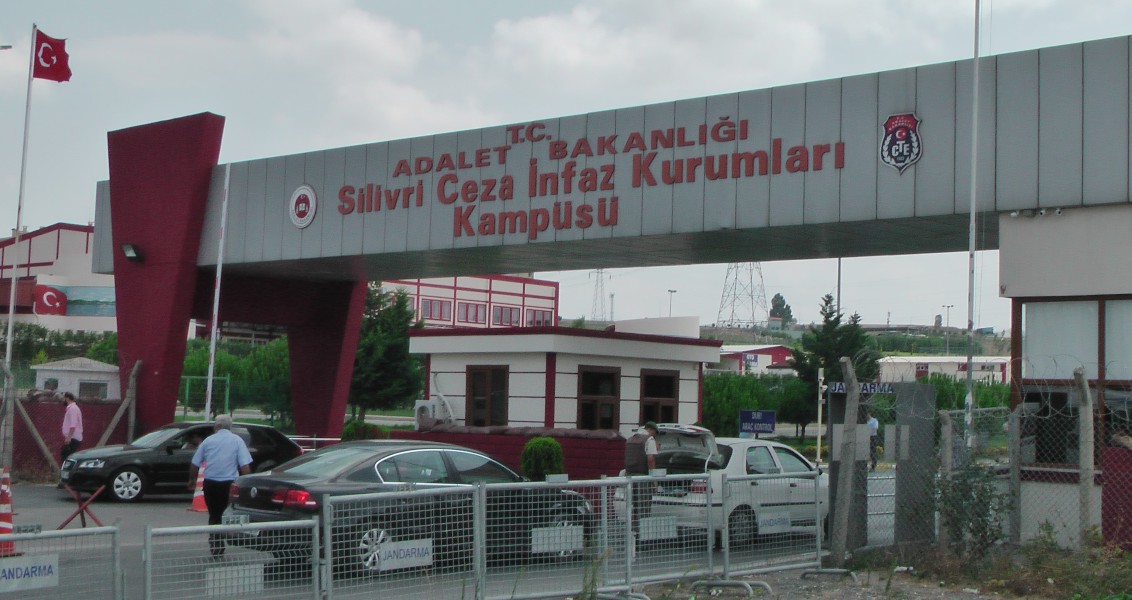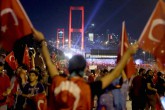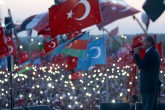Hardly a day passes without new shocking information being unveiled about the Gülenist Terror Organization (FETÖ) whose members were behind the atrocious coup attempt on July 15.
Having infiltrated state institutions for 40 years through their underground network, this illegal organization’s heretical and marginal religious comprehension and the crimes committed by its brainwashed militants are being revealed one by one.
I believe that the dark incidents of our recent political situation will be illuminated with the dissolution of FETÖ. No one would be surprised if many of the recent incidents, including assassinations and the discharge of Deniz Baykal, the former chairman of the Republican People’s Party (CHP), the Uludere incident and the downing of the Russian jet are revealed to be related to this organization.
As FETÖ’s sins are revealed, the first question that comes to mind is: “Who in fact initiated the trouble?”
Of course, we can rightfully complain about the role and aims of foreign intelligence organizations. However, we cannot condone the fact that this illegal structure emerged and grew within Turkey and evolved into an empire of fear through political weak links.
Unfortunately, the search for the ones in charge of this organization has led to the tendency to accuse the opposite side. However, while trying to answer the question “How did we get here?” we have to make prudent and open-hearted analyses.
Everyone must critically examine themselves with regard to their approach to the Gülen Movement; including politicians, journalists, academics, businessmen and the commoners. This self-criticism should not merely consist of a confession of not discovering the true motivations of this massive organization. It must also form the basis of democratic and public negotiations in terms of confronting all the mistakes that have been made throughout the history of the Republic. Every point must be taken into consideration; ranging from radical secularist policies to the transformation of tutelage and the questioning of monopolistic countries and the pro-coup mindset of the elite stratum whose desire is to seize control of the Turkish state. It came as no surprise that President Recep Tayyip Erdoğan displayed his leadership in this move of democratic confrontation. Speaking Wednesday at the Extraordinary Religion Council organized by the Presidency of Religious Affairs (DİB) in Ankara, Erdoğan pointed out that he had once supported this organization that disguised itself as a religious and an educational service in good faith, just like all the other politicians did. He added that the fight against the organization, from which they have diverged on many aspects, began in 2010 and, regrettably, the president mentioned that this shady movement did not display its true colors before it morphed into the dangerous organization it is today.
These sincere expressions show the mistakes being made by the Islamic and conservative segments of society in their approach to FETÖ. Among some dissidents, Erdoğan’s remarks are seen as an effort to legitimize the eradication of a structure that was supported by the Justice and Development Party (AK Party) before.
While it is true that FETÖ benefited from the opportunities it had when, beginning in 2007, the Kemalist tutelage rendered the AK Party open to the influence of the Gülen Movement, the consequences of supporting such a movement are evident and the movement’s claims of “service” need to be thoroughly evaluated alongside its terrorist structuring. We must particularly focus on the long-term, albeit strange, relationship the organization has had with Kemalism. Declaring its loyalty to Kemalists in order to infiltrate state institutions during the 1980 coup and the Feb. 28 process, the Gülen Movement has, from the very beginning, been an extreme reaction to radical secularism.
In this sense, FETÖ is the most sophisticated anomaly caused by the authoritarian modernization of the Republican period.
Unlike religious groups that aspire to realize their Islamic goals through the democratic channels of politics, Gülen decided to fight against Kemalism by following the path of Kemalists. In the same way that Kemalists concealed their secularist views during the Independence War, Gülenists have been concealing their true motivations as a way to seize control over the state for years. By building a parallel educational network within the state, the organization aims to build a new generation and seize the ruling power in the aftermath. Even more startling, the organization endeavored to legitimize all sorts of plots and conspiracies they themselves engaged in from a twisted and mystical point of view. Their esoteric belief associating Gülen’s year of birth with Mustafa Kemal’s death is only one example showcasing that. In a nutshell, all political agents, who have used the material produced by FETÖ including its cadres and discourses, need to take a critical look in the mirror right now.
[Daily Sabah, August 6, 2016]
In this article
- Domestic Policy
- Opinion
- 12 September 1980 Turkish coup d'état
- 1980
- 2007
- 2010
- 2016
- Daily Sabah
- Deniz Baykal
- February 28th Post-Modern Coup | 1997 Turkish Military Memorandum
- Fethullah Terrorist Organization (FETÖ)
- Gülen Movement
- Gülenist Terror Organization
- Hizmet Movement
- Islam
- Islamic
- Kemalism
- Recep Tayyip Erdoğan
- Russia
- The President of the Republic of Türkiye
- Turkish President
- Türkiye's Justice and Development Party | AK Party (AK Parti)
- Türkiye's Republican People's Party (CHP)



